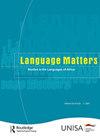津巴布韦和南非特松加语的语音和语义变化
IF 0.8
3区 文学
0 LANGUAGE & LINGUISTICS
引用次数: 0
摘要
摘要聪加语是南非、莫桑比克、津巴布韦和斯威士兰的一种跨国界语言。本文主要研究津巴布韦和南非所说的聪加语的变体。本文的目的是用比较的方法讨论南非和津巴布韦的聪加语在语音和语义上的差异。对来自津巴布韦和南非的20名讲聪加第一语言的人进行了访谈。还使用了文件分析。拉博夫(1972)的变异理论指出,任何给定的语言都存在变异。这篇文章讨论了某些词汇中辅音发音位置的差异,强调了语音过程,如唇化与腭化、腭化与唇化、鼻化与非鼻化以及吸气与非吸气。还讨论了语义变化。研究发现,津巴布韦和南非的聪加语在语音和语义上存在异同。本文章由计算机程序翻译,如有差异,请以英文原文为准。
Phonological and Semantic Variations in Tsonga Spoken in Zimbabwe and South Africa
Abstract Tsonga is a cross-border language spoken in South Africa, Mozambique, Zimbabwe, and Eswatini. This article focuses on variations of Tsonga spoken in Zimbabwe and South Africa. The aim of this article is to discuss the phonological and semantic differences between Tsonga spoken in South Africa and Zimbabwe using a comparative approach. Interviews were conducted among 20 Tsonga first language speakers from Zimbabwe and South Africa. Document analysis was also used. Labov's (1972) variation theory, which points out that there is variation in any given language, was employed. The article discusses differences in places of articulation of consonants found in certain lexical items, highlighting phonological processes such as labialisation versus palatalisation, velarisation versus labialisation, nasalisation versus non- nasalisation, and aspiration versus non-aspiration. Semantic variations are also discussed. It was found that there are phonological and semantic similarities and differences between Tsonga spoken in Zimbabwe and South Africa.
求助全文
通过发布文献求助,成功后即可免费获取论文全文。
去求助
来源期刊

Language Matters
Multiple-
CiteScore
1.20
自引率
0.00%
发文量
19
期刊介绍:
The purpose of Language Matters is to provide a journal of international standing with a unique African flavour focusing on multilingualism in Africa. Although the journal contributes to the language debate on all African languages, sub-Saharan Africa and issues related to multilingualism in the southern African context are the journal’s specific domains. The journal seeks to promote the dissemination of ideas, points of view, teaching strategies and research on different aspects of African languages, providing a forum for discussion on the whole spectrum of language usage and debate in Africa. The journal endorses a multidisciplinary approach to the study of language and welcomes contributions not only from sociolinguists, psycholinguists and the like, but also from educationalists, language practitioners, computer analysts, engineers or scholars with a genuine interest in and contribution to the study of language. All contributions are critically reviewed by at least two referees. Although the general focus remains on multilingualism and related issues, one of the three issues of Language Matters published each year is a special thematic edition on Language Politics in Africa. These special issues embrace a wide spectrum of language matters of current relevance in Southern Africa.
 求助内容:
求助内容: 应助结果提醒方式:
应助结果提醒方式:


